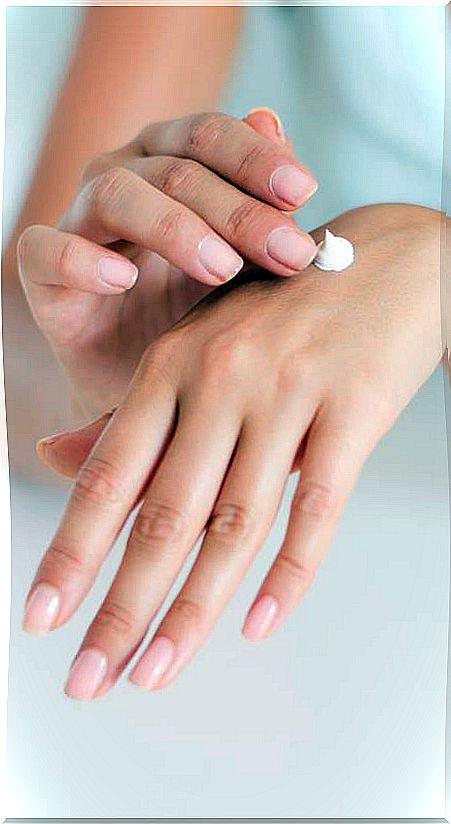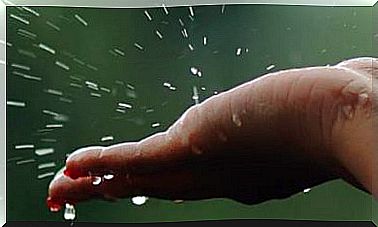How To Treat Atopic Dermatitis In Winter
Cold, continuous hand washing and hydroalcoholic gels can cause outbreaks of atopic dermatitis. You can prevent them with natural measures.

The cold, the dryness of the heating and the use of hydroalcoholic gels and soaps and even masks can promote outbreaks of atopic dermatitis, an inflammatory skin condition that affects approximately 3-10 percent of adults and the 20% of children. It appears as a result of a reaction of the immune system to various substances, ranging from allergens (substances that cause an allergic reaction) to artificial chemicals. It tends to be a hereditary problem.
The symptoms of dermatitis or eczema are redness, intense itching, irritation, peeling and cracking of the skin. To prevent its appearance, contact with allergenic and irritating substances should be avoided as much as possible and take care of the skin with natural means.
Measures to prevent eczema
Taking a series of measures can reduce the intensity and duration of outbreaks, which become more frequent in winter.
Avoid triggers
The best way to prevent an eczema outbreak is to avoid triggers such as pollen, pet dander, and foods to which you are allergic. Chemical products found in synthetic fabrics, cosmetic and hygiene products, and even jewelery and costume jewelery that are in contact with the skin are also triggers. Use wide and soft clothing such as cotton or cellulosic fibers (Lyocell, etc.) mixed with cotton, avoiding synthetic fabrics and wool.
Masks made of synthetic materials can favor the appearance of dermatitis, especially in children. The Spanish Society of Clinical Immunology, Allergology and Pediatric Asthma advises the use of 100% cotton masks, approved and reusable if it is observed that surgical, disposable hygienic or FFP2 masks cause symptoms.
Both children and adults should preferably wash their hands with soap and water and leave the hydroalcoholic gel for when this is not possible.
On the other hand, keep in mind that stress and hormonal changes can also cause breakouts or make them worse.
Protect your skin
It is important to protect the skin’s barrier function with a moisturizing lotion, especially after bathing, which should be done with neither too hot nor too cold water. Choose a certified natural or organic product that does not contain preservatives or fragrances. Throughout the day you can repeat the application of moisturizer, especially on the hands and face.
Another way to protect your skin is by avoiding the temptation to scratch your eczema. This can help prevent cracks and wounds that could become infected. If you have open wounds, be sure to protect your skin with bandages.
Control temperature and humidity
The reaction to temperature and humidity depends on the person. Some people react with the appearance of symptoms to cold and dryness, and others react to heat and humidity. Therefore, in each case the preventive measures will be different.
If you react to cold and dryness, try to stay in a comfortable temperature of between 19 and 22 degrees. The humidity should be between 40 and 60%. If necessary, you could have a humidifier to increase the concentration of water vapor in the air.
If your trigger is heat, avoid overcoat. The heat can make you sweat, making atopic dermatitis worse. At home, apply a fresh water spray, which will directly hydrate your skin.
In any case, it is important to ventilate all interior spaces well, especially those where we spend more time.
Natural treatment of atopic dermatitis
Your doctor may prescribe steroid creams that are applied to the skin for a few days, until the symptoms disappear. They may also prescribe antihistamines by mouth. But these drugs are not without side effects. It is better to try to control the symptoms with natural means.
Oatmeal baths are a type of natural treatment that can relieve the itching and discomfort of eczema rashes. A 5 minute bath in lukewarm water (34 ºC) is enough. To dry off after a bath or shower, cover yourself with the towel, but don’t rub your skin. Immediately afterwards apply a natural moisturizer.
Both probiotics and prebiotics can support the health of the gut microbiota, which in turn can regulate the immune response and inflammation. You can increase your daily servings of unpasteurized fermented foods, such as homemade sauerkraut and kimchi, have yogurt and kefir, or turn to probiotic supplements.
You can increase the consumption of foods rich in omega-3 fatty acids and vitamin A to strengthen the structure of the skin and mucous membranes. In the vegetable diet, omega-3s are found in flax and chia seeds and walnuts. Vitamin A is found in yellow, orange, and green vegetables, such as carrots, squash, sweet potatoes, apricots, and broccoli.
And, above all, rest. Take breaks throughout the day and make sure you sleep without tension for 7-8 hours straight.
In the article Live without eczema and forget about itching in a natural way, by Dr. Josep Lluís Berdonces, you will find more advice on food and medicinal plants.









